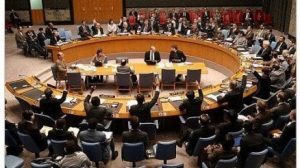UNITED NATIONS: Pakistan wants the UN Security Council (UNSC) to be more open, accountable, and representative in order to protect world peace and security. However, it has warned that adding more members to the current 15-member body would “statistically multiply the prospects of its paralysis.”

In his speech to the General Assembly on the UNSC changes, Pakistan’s Permanent Representative, Ambassador Munir Akram, said that the main reason the UNSC often fails to effectively resolve conflicts is that its permanent members can’t agree on what to do.
It’s been more than a month since a cruel war broke out in Gaza. Akram pointed out that Israel was committing war crimes and genocide against innocent Palestinian women and children, and the UNSC had not done anything to stop the “slaughter” of Palestinians in the blockaded Gaza Strip.
In this case, the Pakistani ambassador said that adding more regular members to a council that was already bigger would statistically make it more likely that it would become paralyzed. “The issue itself cannot be the answer,” Ambassador Akram told the group.
“Any country that wants to be on the Security Council more often should go through the democratic process of being elected by the General Assembly on a regular basis,” he said, adding that the Uniting for Consensus (UfC) group was against adding more permanent UNSC places.
The talks between governments that were supposed to change the Security Council and started in February 2009 have not moved forward. The UfC, which was led by Italy and Pakistan, was against the so-called “Group of Four,” which is made up of India, Brazil, Germany, and Japan. They want stable seats on the Council.
The IGN process looks at five main areas: the types of people who can join, the veto power, regional participation, the size of a bigger UNSC, how the council works, and its connection with the General Assembly.
As part of the UN reform process, most member states think that the UNSC should be bigger, but they disagree on the specifics. The Group of Four hasn’t changed its position on its plan to add 10 seats to the council, with six regular members and four non-permanent members.
Akram said, “The four individual aspirants” would have to answer to no one but themselves and work to further their own national goals and interests. Also, Africa wanted two permanent places that would be filled by states chosen by Africa and responsible to Africa. This was a different request.
There are five permanent members of the UNSC right now: the United States, Britain, China, France, and Russia. There are also 10 non-permanent members who are chosen every two years. The UfC Group wants to add a new type of non-permanent members whose terms would be longer and who could be re-elected.
There are 59 small and medium-sized states that have never been on the Security Council before, according to Ambassador Akram. The UfC wants to add up to 12 new non-permanent seats to give these states more participation.
“Besides making sure fair geopolitical representation,” he said, “a larger number of non-permanent members could balance the influence of the five permanent members.” He also said that the non-permanent members’ regular elections would make the UN more democratic and accountable.
“There are more than four or six states, perhaps over 20, which can, based on their size, defence capability, economic status, peacekeeping role and contributions to peace and security, claim the mantle of more frequent representation on the Security Council,” he stated.
“The UfC’s offer of longer-term seats could work for them,” Ambassador Akram said. He warned that a plan for reforming the UNSC could not be made until the five groups of issues’ main disagreements were settled between the member states.










































